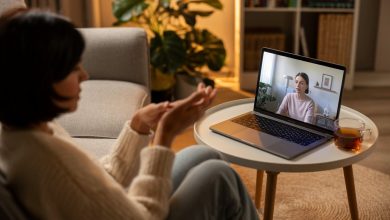Blue Light Glasses: Myth or Miracle?
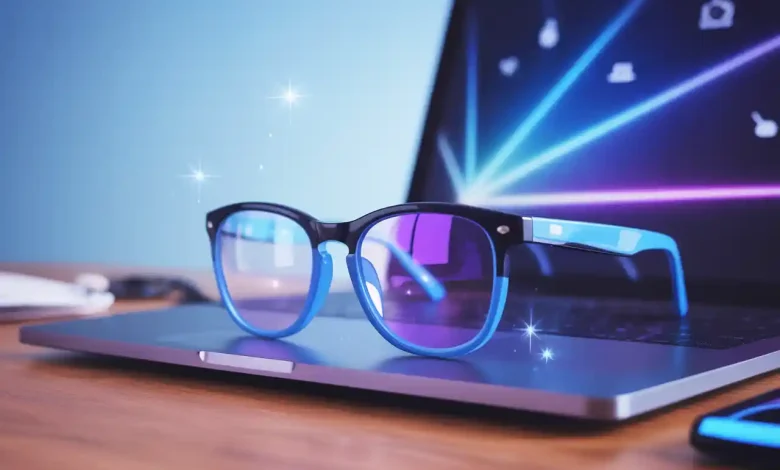
INTRODUCTION
before staring at digital screens—whether working from home, attending online classes, gaming, or scrolling through social media—the question of how to protect our eyes from potential harm has never been more urgent. Screens on smartphones, laptops, tablets, and televisions all emit blue light, a high-energy visible light that some experts believe may contribute to digital eye strain, sleep problems, and even long-term eye health issues.
The popularity of blue light glasses has soared as more people look for ways to reduce the discomfort and fatigue that can come from hours of screen use. Advertisements and influencers often claim these glasses can prevent headaches, reduce eye strain, and help you sleep better at night.
Some even suggest that wearing blue light glasses is essential for anyone who spends significant time in front of a computer or phone. This has led to a booming market, with countless brands offering stylish frames, different lens colors, and promises of healthier eyes.
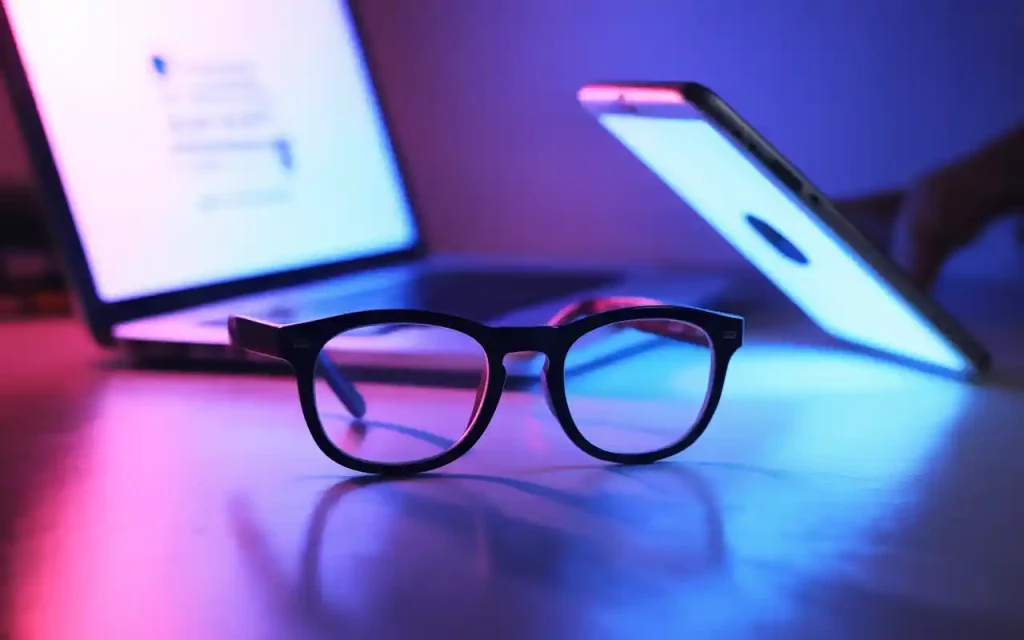
But do blue light glasses actually deliver on these promises, or are they simply a trendy accessory with little real benefit? Are the claims about blue light and eye health supported by strong scientific evidence, or are they mostly marketing hype? With so much conflicting information online, it can be difficult to know what to believe and whether investing in blue light glasses is truly necessary.
In this article, we will take a deep dive into the world of blue light glasses. We will explore what blue light is, how it affects your eyes and sleep, what the latest research says about the effectiveness of blue light glasses, and who might actually benefit from using them.
We will also look at the myths and facts, the different types of blue light glasses available, and practical tips for keeping your eyes healthy in our digital world. Whether you are a student, a professional, a gamer, or a parent concerned about your child’s screen time, this guide will help you make an informed decision about blue light glasses and your eye health.
What Are Blue Light Glasses?
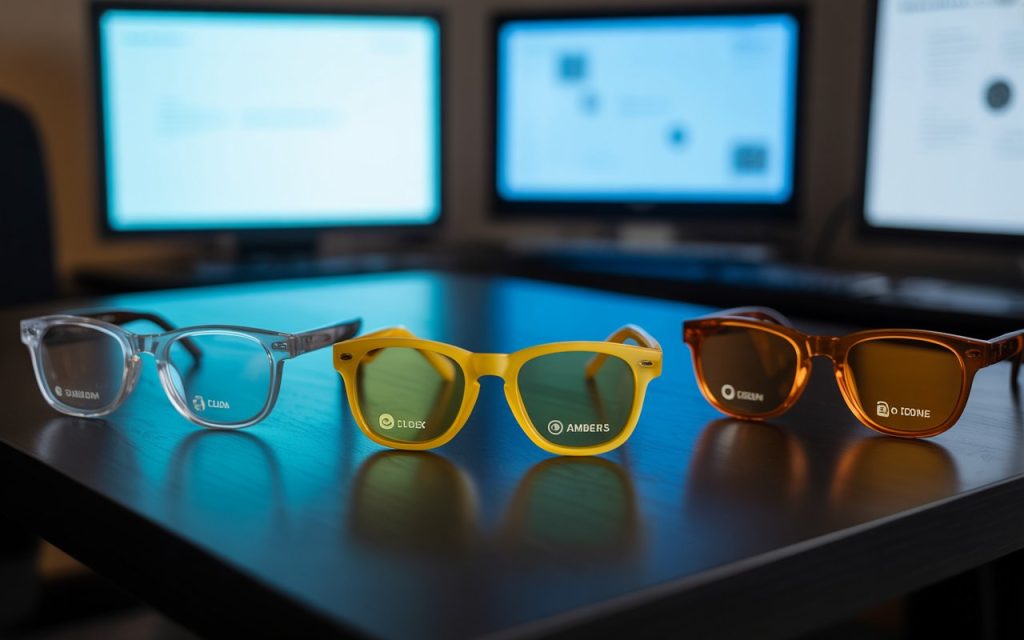
Blue light glasses are special eyewear designed to block or filter out blue light from digital screens like phones, computers, and TVs. The idea is that blue light glasses can help with eye strain, headaches, and even trouble sleeping. They come in many styles, including clear, yellow, amber, and even prescription options.
How Do Blue Light Glasses Work?
Blue light glasses have lenses that block or absorb blue light, especially in the 400–455 nanometer range. Wearing blue light glasses means less blue light reaches your eyes. Some blue light glasses block 20% of blue light, while others block up to 90% or more, depending on the lens color and design.
The Science Behind Blue Light
- What is Blue Light?
Blue light is a type of visible light with a short wavelength and high energy. It is found in sunlight and in large amounts from digital screens and LED lights. - How Does Blue Light Affect Eyes?
Blue light can scatter more easily than other light, making it harder for your eyes to focus. This can lead to eye strain, especially after long periods of screen use. Blue light also affects your sleep by interfering with melatonin, the hormone that helps you sleep.
Do Blue Light Glasses Really Help?
Eye Strain
Blue light glasses are marketed to reduce digital eye strain, but research is mixed. Some studies show little to no difference, while others report reduced symptoms like dry eyes, blurred vision, and headaches. Most eye strain comes from staring at screens too long, not just from blue light. Blinking less and focusing up close for hours are bigger causes.
Sleep Quality
Blue light can disrupt your sleep by stopping your body from making melatonin. Blue light glasses may help if you use screens before bed, but the best way is to avoid screens an hour before sleeping. Some studies show blue light glasses can reduce the time it takes to fall asleep, especially for people with sleep disorders or shift work.
Headaches
There is not enough strong proof that blue light glasses prevent headaches. Taking breaks from screens and adjusting lighting are more helpful.
Long-Term Eye Health
There is no strong evidence that blue light from screens causes permanent eye damage or diseases like macular degeneration. Blue light glasses are not proven to prevent eye diseases.
Myths vs. Facts About Blue Light Glasses
| Myth | Fact | Explanation |
|---|---|---|
| Blue light glasses cure all eye issues | Blue light glasses may help a little, but not for all problems. | Most eye strain is caused by screen habits, not just blue light. |
| They protect your eyes from all harm | Blue light glasses only block some blue light, not all eye damage. | UV and other light types can also harm eyes; blue light glasses do not block all harmful rays. |
| You must wear them all day | Blue light glasses are best when using screens for long periods. | Use them mainly during heavy screen time, not all day. |
| Blue light from screens is dangerous | Normal screen use is not proven to cause eye disease. | No conclusive evidence links screen blue light to eye diseases. |
| All blue light is bad | Some blue light is good for mood and alertness during the day. | Blue light helps regulate your body clock and keeps you awake. |
| Blue light glasses drastically improve sleep | They may help, but good sleep habits matter more. | Avoiding screens before bed is more effective. |
| Only heavy screen users need blue light glasses | Anyone exposed to screens or artificial light may benefit. | Even small amounts of blue light can affect sensitive people. |
| Expensive blue light glasses are always better | Quality matters more than price. | Check lens quality and blue light blocking percentage, not just the price tag. |
| Blue light glasses can cure digital eye strain completely | They help, but breaks and good habits are more important. | Use the 20-20-20 rule and adjust your workspace for best results. |
| Blue light glasses are unsafe for children | Blue light glasses are safe for kids and can help with screen time. | They are made with safe materials and designed for comfort. |
| Blue light glasses block all blue light | Most blue light glasses block a percentage, not all blue light. | The amount blocked depends on the lens type and quality. |
| All blue light glasses look the same | Blue light glasses come in different styles, colors, and lens types. | Choose the one that fits your needs and comfort. |
Blue Light Glasses: Types and Features
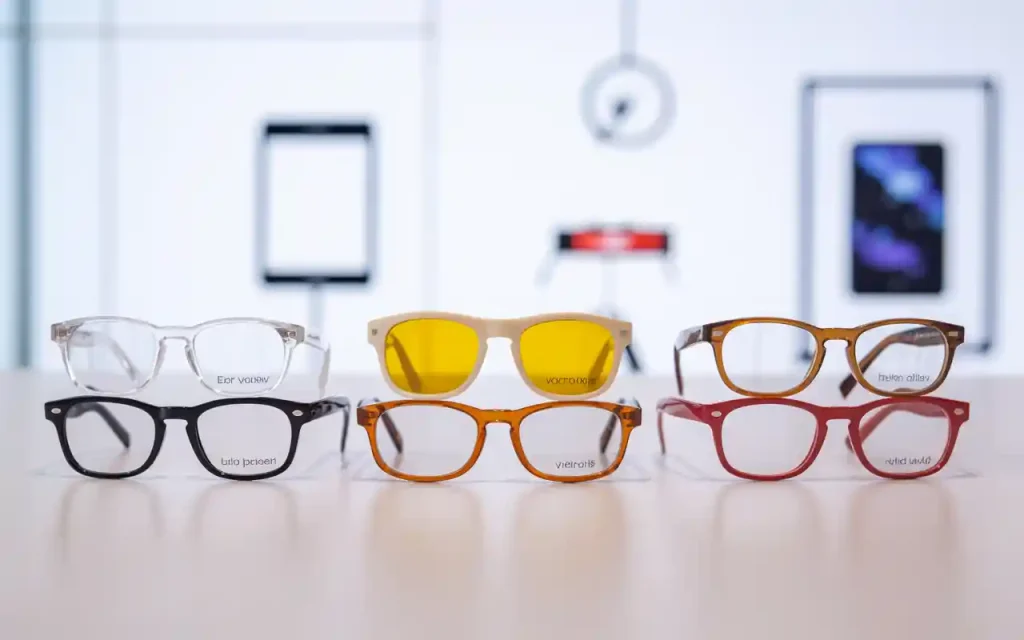
- Clear Lenses:
Block a small amount of blue light, look like regular glasses. Good for daytime use and minimal color change. - Yellow or Amber Lenses:
Block more blue light, may change how colors look. Often used for gaming or night use. - Red or Orange Lenses:
Block the most blue light, especially for night use. Can make screens look very different. - Prescription Blue Light Glasses:
Combine vision correction with blue light blocking. Available for people who need glasses for reading or distance. - Kids’ Blue Light Glasses:
Sized for children, often with flexible, durable frames and fun colors. Help protect young eyes during online learning or gaming. - Clip-On and Fitover Glasses:
Can be added to regular glasses for extra blue light protection.
Who Might Benefit from Blue Light Glasses?
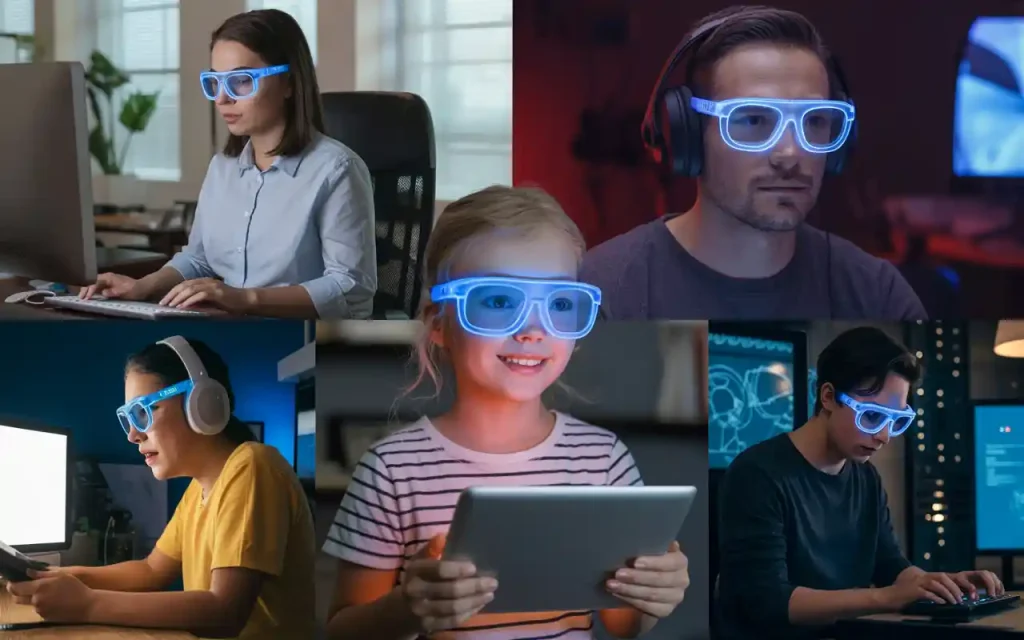
- Office Workers:
People who spend long hours at computers may notice less eye fatigue and better focus with blue light glasses. Anti-glare coatings can help with harsh office lighting. - Gamers:
Gamers often use screens for hours. Special gaming blue light glasses with yellow or amber lenses can help reduce eye strain and improve comfort during long sessions. - Children and Teens:
Kids are using screens more than ever for school and play. Blue light glasses for children are safe and can help reduce eye strain and support better sleep habits. - Night Shift Workers:
People who work at night or use screens late can benefit from glasses that block more blue light to help maintain healthy sleep cycles. - Anyone Sensitive to Light:
People who get headaches or migraines from screens may find relief with blue light glasses.
Alternatives and Extra Tips for Eye Comfort
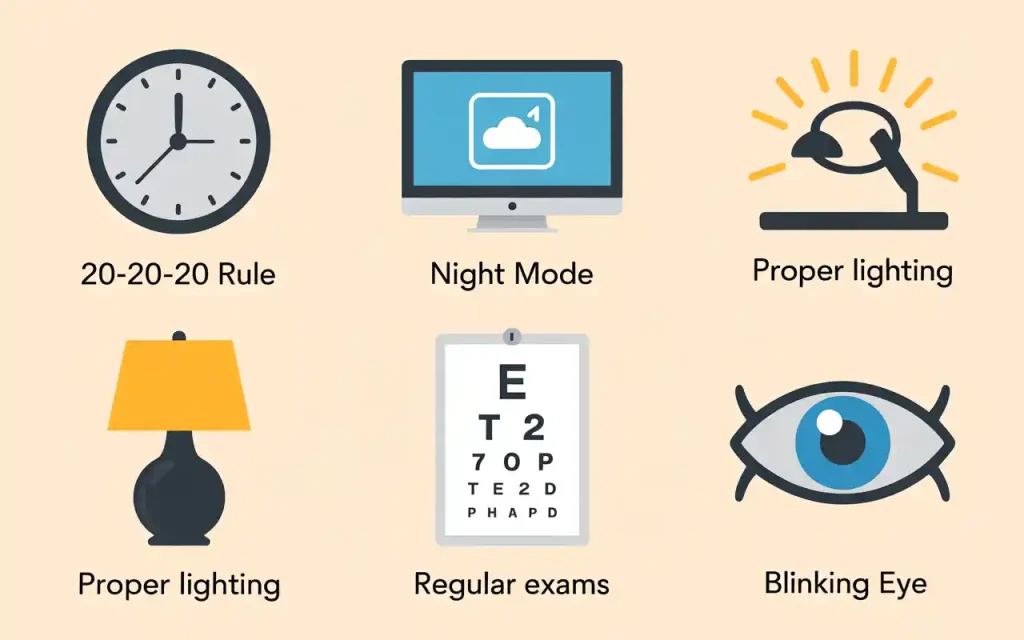
- 20-20-20 Rule:
Every 20 minutes, look at something 20 feet away for 20 seconds. This helps relax your eyes and prevent strain. - Screen Settings:
Use night mode or blue light filters on your devices. Many phones and computers have built-in settings to reduce blue light. - Proper Lighting:
Make sure your room is well-lit to reduce eye strain. Avoid glare and harsh lighting. - Regular Eye Exams:
Visit an eye doctor to check your vision and eye health, especially if you have ongoing discomfort. - Blink Often:
Blinking keeps your eyes moist and comfortable. People blink less when using screens, so remember to blink more often. - Adjust Screen Brightness:
Lower your screen brightness to match your environment. Too much brightness can increase eye strain. - Adjust Text Size:
Increase the text size on your screen to make reading easier and reduce squinting. - Use Matte Screen Protectors:
These reduce glare and reflections, making screens easier on your eyes.
Blue Light Glasses for Children: Special Considerations
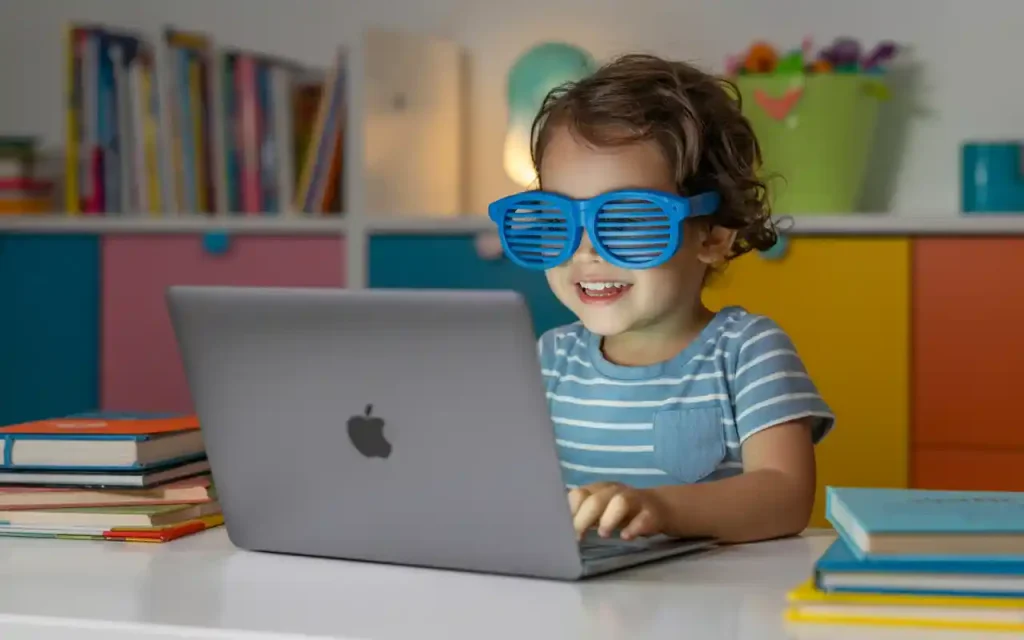
- Why Kids Need Protection:
Children’s eyes are still developing and may be more sensitive to blue light. With more online learning and gaming, blue light glasses can help reduce eye strain, dryness, and headaches. - Features for Kids:
- Flexible, durable frames
- Fun colors and designs
- Lightweight and comfortable
- Prescription and non-prescription options
- Are They Safe?
Yes, blue light glasses for children are safe and do not harm vision. They are made with safe materials and designed for comfort. - Teaching Good Habits:
Encourage kids to take breaks, use screens in well-lit rooms, and avoid screens before bedtime, even if they wear blue light glasses.
Blue Light Glasses for Gamers
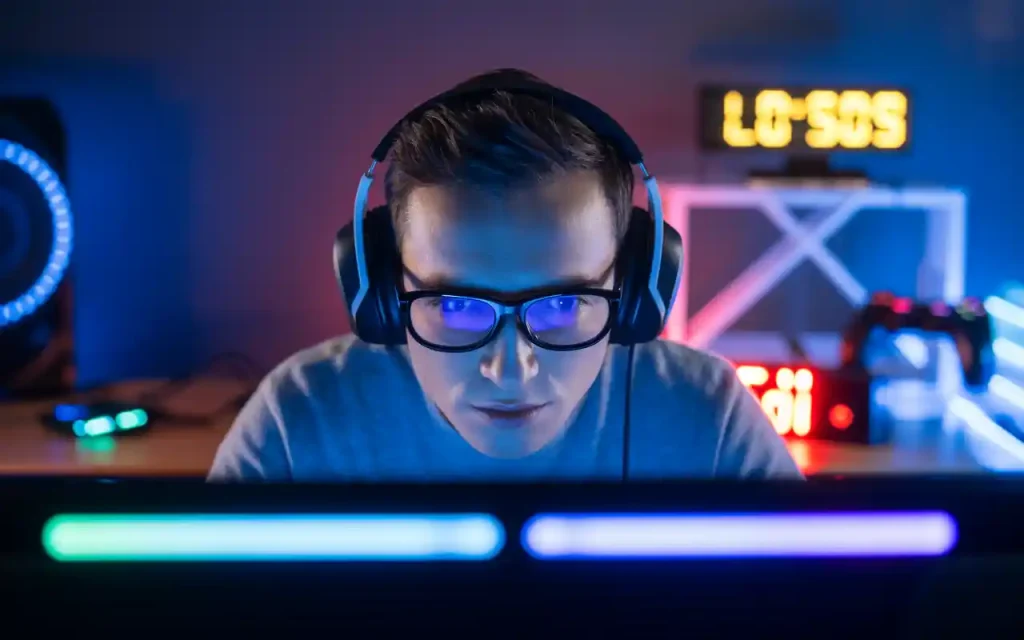
- Why Gamers Need Them:
Gamers often play for hours, leading to eye strain, headaches, and trouble sleeping. Gaming blue light glasses are designed for comfort during long sessions and often have yellow or amber lenses for extra protection. - Key Features:
- Lightweight, comfortable frames for headset use
- High blue light blocking percentage
- Anti-glare and anti-scratch coatings
- Stylish designs for on- and off-screen wear
- Benefits:
- Reduced eye fatigue and dryness
- Fewer headaches and better focus
- Improved sleep after late-night gaming
Blue Light Glasses for Office Workers
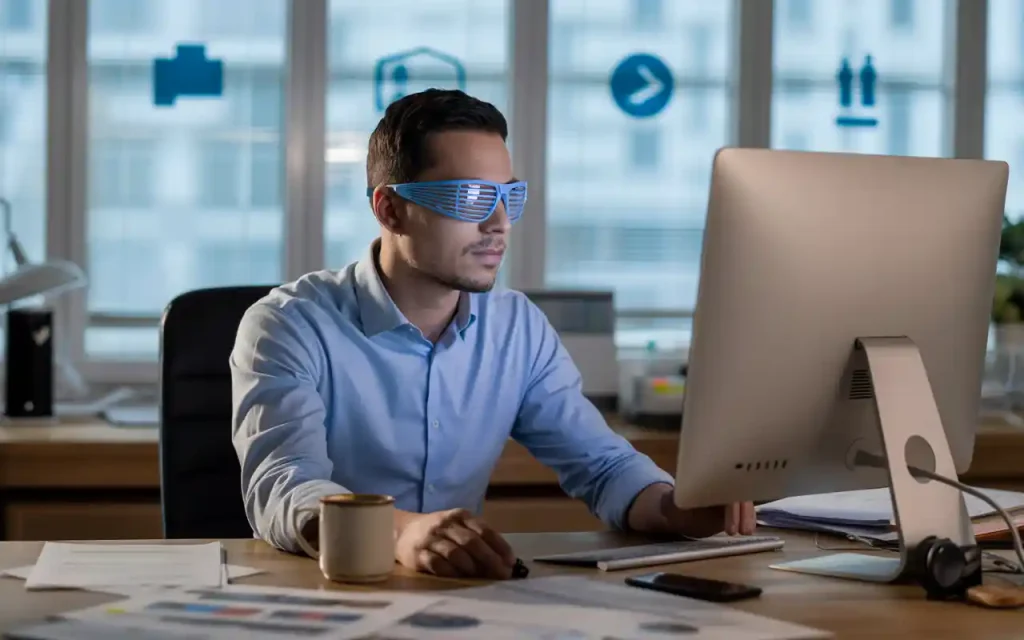
- Why Office Workers Need Them:
Office workers spend hours in front of screens under artificial lighting, leading to digital eye strain, headaches, and sleep problems. - Key Features:
- Clear lenses that filter a significant amount of blue light
- Anti-glare coatings for harsh lighting
- Comfortable, professional styles
- Prescription options available
- Benefits:
- Less eye fatigue and dryness
- Improved productivity and focus
- Better sleep and overall well-being
- Extra Tips:
- Use natural light when possible
- Take regular breaks
- Adjust your workspace for comfort
Blue Light Glasses: Should You Buy Them?
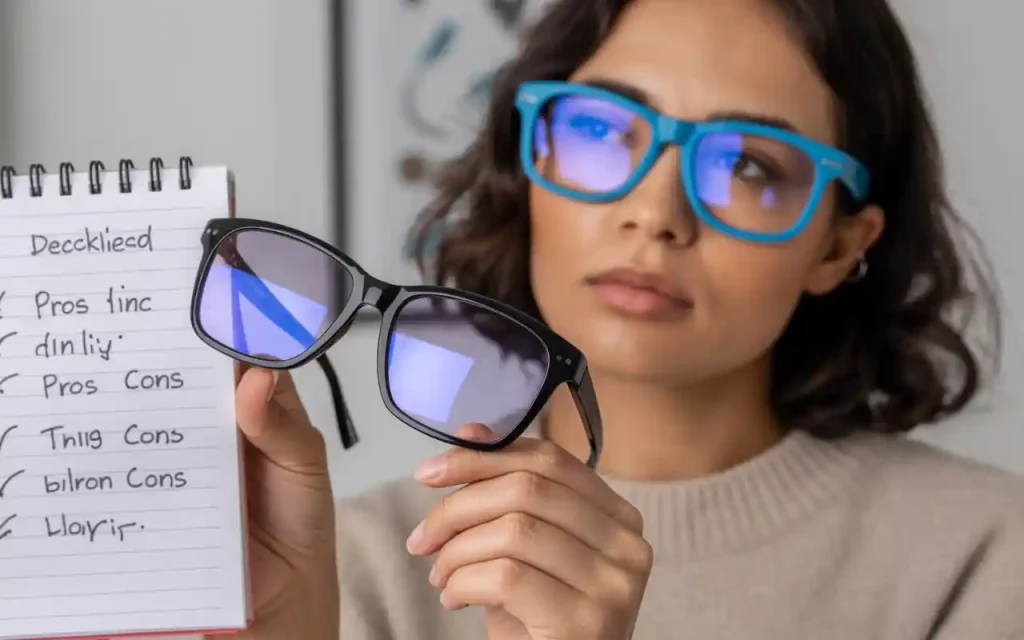
If you spend many hours on screens and feel eye discomfort, blue light glasses might help a bit. But remember, the best ways to protect your eyes are:
- Take regular breaks (every 20 minutes, look 20 feet away for 20 seconds)
- Adjust your screen brightness
- Blink often to keep your eyes moist
- Avoid screens before bedtime, even if you wear blue light glasses
- Use device settings to reduce blue light
Quotes
- “Blue light glasses have quickly become one of the most talked-about solutions for modern eye care.”
- “But do blue light glasses actually deliver on these promises, or are they simply a trendy accessory with little real benefit?”
- “Most eye strain comes from staring at screens too long, not just from blue light.”
- “There is no strong evidence that blue light from screens causes permanent eye damage or diseases like macular degeneration.”
- “Blue light glasses may help some people, but they are not magic.”
- “Simple habits like taking breaks, adjusting your environment, and reducing screen time are more effective for healthy eyes.”
- “Blue light glasses can be part of your plan, but don’t rely on blue light glasses alone.”
- “Children’s eyes are still developing and may be more sensitive to blue light.”
- “Quality matters more than price. Check lens quality and blue light blocking percentage, not just the price tag.”
- “For the best eye health, combine blue light glasses with good screen habits and regular eye check-ups.”
Highlighted Points
- Blue light glasses are designed to block or filter blue light from digital screens.
- They come in various styles, including clear, yellow, amber, and prescription options.
- Blue light can scatter more easily, making it harder for your eyes to focus and possibly leading to eye strain.
- Research is mixed: some studies show little benefit, while others report reduced symptoms like dry eyes or headaches.
- Blue light glasses may help with sleep if you use screens before bed, but avoiding screens before sleep is more effective.
- There is no strong evidence that blue light glasses prevent headaches or long-term eye diseases.
- Most eye strain is caused by prolonged screen use, not just blue light exposure.
- Types of blue light glasses include clear, yellow/amber, red/orange, prescription, kids’ versions, and clip-on styles.
- People who may benefit include office workers, gamers, children, night shift workers, and those sensitive to light.
- Alternatives include the 20-20-20 rule, using night mode on devices, proper lighting, regular eye exams, blinking more, and adjusting screen brightness.
- For children, blue light glasses are safe and can help reduce eye strain, but teaching good screen habits is also important.
- For gamers and office workers, blue light glasses can reduce fatigue and improve comfort during long sessions.
- Expensive blue light glasses are not always better—focus on lens quality and blue light blocking percentage.
- Frequently asked questions cover safety, effectiveness, usage duration, and suitability for children.
- Blue light glasses are not a miracle solution; combine them with good habits for the best results.
Frequently Asked Questions
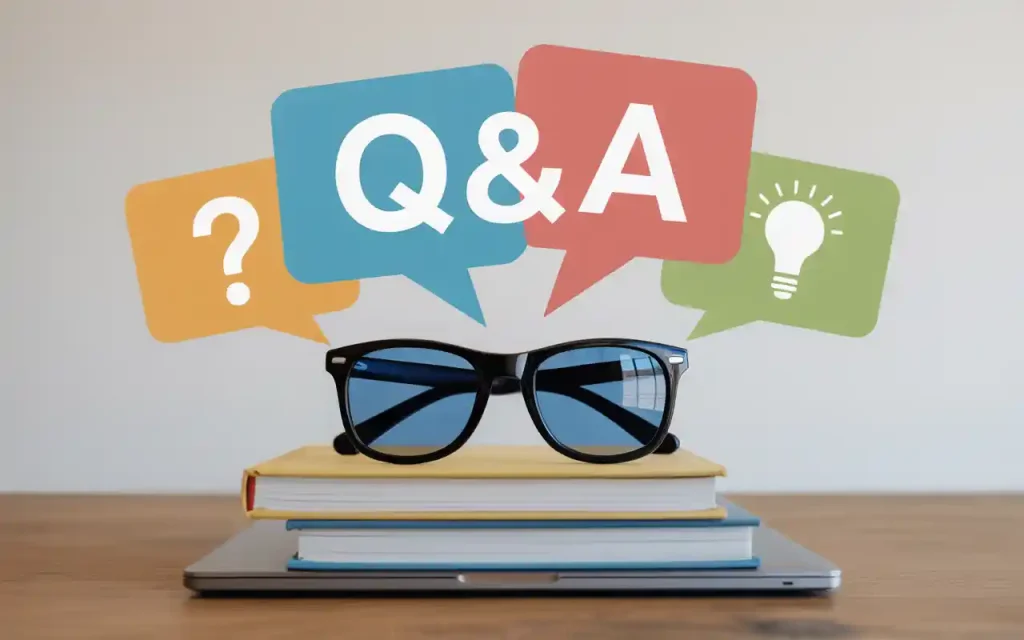
Q: Can blue light glasses damage my eyes?
A: No, blue light glasses are safe to wear and will not harm your eyes.
Q: Do blue light glasses help with computer vision syndrome?
A: They may help a little, but taking breaks and adjusting your screen is more effective.
Q: Should I wear blue light glasses all day?
A: Only when using screens for long periods.
Q: Are expensive blue light glasses better?
A: Not always. The most important thing is the quality of the lenses, not the price.
Q: Can I use blue light glasses with contact lenses?
A: Yes, you can wear blue light glasses over contact lenses.
Q: Do blue light glasses help with sleep?
A: They might help a little if you use screens before bed, but the best way is to avoid screens before sleeping.
Q: Are blue light glasses safe for children?
A: Yes, blue light glasses are safe for kids and can help with screen time.
Q: Do blue light glasses block all blue light?
A: Most blue light glasses block a percentage of blue light, not all of it. The amount depends on the lens type.
Q: Can I wear blue light glasses outside?
A: Yes, but they are mainly designed for indoor screen use. For outdoor use, sunglasses with UV protection are better.
CONCLUSION
Blue light glasses are not a miracle solution. Blue light glasses may help some people, but they are not magic. Simple habits like taking breaks, adjusting your environment, and reducing screen time are more effective for healthy eyes. Blue light glasses can be part of your plan, but don’t rely on blue light glasses alone.

